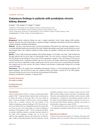 September 2009 in “Dermato-endocrinology”
September 2009 in “Dermato-endocrinology” Good nutrition and vitamins are important for healthy skin and can prevent diseases.
 24 citations,
May 2009 in “Veterinary Dermatology”
24 citations,
May 2009 in “Veterinary Dermatology” The document concludes that veterinary dermatologists need more experience and a better approach to treating skin diseases in nonhuman primates.
 5 citations,
February 2022 in “Frontiers in physiology”
5 citations,
February 2022 in “Frontiers in physiology” Hair graying is influenced by factors like nerves, fat cells, and immune cells, not just hair follicles.
22 citations,
March 2017 in “Journal of the Formosan Medical Association” The guidelines help doctors manage skin problems from certain cancer treatments to improve patients' lives.
 January 2021 in “Erciyes medical journal”
January 2021 in “Erciyes medical journal” The COVID-19 pandemic changed the types of skin conditions seen at a clinic, with fewer patients and varying numbers of specific conditions.
 13 citations,
January 2018 in “Annals of Dermatology”
13 citations,
January 2018 in “Annals of Dermatology” Alopecia areata and androgenetic alopecia affect quality of life similarly.
3 citations,
February 2020 in “The Egyptian Rheumatologist” Recognizing LET and AITD can help diagnose SLE early for better treatment.
 9 citations,
April 2023 in “Frontiers in immunology”
9 citations,
April 2023 in “Frontiers in immunology” New technologies help us better understand how skin microbes affect skin diseases.

People with Down syndrome have a higher risk of skin disorders and need better screening and treatment.
 19 citations,
May 2019 in “JAMA dermatology”
19 citations,
May 2019 in “JAMA dermatology” People with alopecia areata have similar overall death rates as others but higher risks of death from self-harm, psychiatric issues, and lung cancer in certain cases.
 1 citations,
October 2021 in “Deleted Journal”
1 citations,
October 2021 in “Deleted Journal” Dupilumab can help regrow hair and improve skin conditions in patients with severe atopic dermatitis and alopecia areata.
 January 2024 in “Journal of dermatology and skin science”
January 2024 in “Journal of dermatology and skin science” Topical aprepitant reduces skin rash and hair loss caused by cancer treatment.
 12 citations,
March 2022 in “Frontiers in Nutrition”
12 citations,
March 2022 in “Frontiers in Nutrition” Obesity is linked to various skin conditions and issues, and losing weight can improve these conditions.
 2 citations,
September 2022 in “Cytotherapy”
2 citations,
September 2022 in “Cytotherapy” Fat-derived stem cells show promise for treating skin issues and improving wound healing, but more research is needed to confirm the best way to use them.
 4 citations,
June 2019 in “International Journal of Dermatology and Venereology”
4 citations,
June 2019 in “International Journal of Dermatology and Venereology” Some skin diseases may indicate a higher risk of metabolic syndrome and related health issues.
 26 citations,
July 2021 in “Frontiers in Cell and Developmental Biology”
26 citations,
July 2021 in “Frontiers in Cell and Developmental Biology” The review suggests that a special cell-derived treatment shows promise for various skin conditions and hair growth but needs more research for confirmation.
 4 citations,
August 2011 in “Aktuelle Dermatologie”
4 citations,
August 2011 in “Aktuelle Dermatologie” Topical melatonin is a safe treatment that may reduce hair loss in people with androgenetic alopecia.
 21 citations,
September 2018 in “International journal of women’s dermatology”
21 citations,
September 2018 in “International journal of women’s dermatology” People with Lichen planopilaris are more likely to have certain autoimmune and endocrine disorders but less likely to have conditions like allergies and diabetes.
 100 citations,
July 2018 in “Journal of The American Academy of Dermatology”
100 citations,
July 2018 in “Journal of The American Academy of Dermatology” People with alopecia areata often have other health issues like skin diseases, metabolic syndrome, stomach infections, lupus, anemia, thyroid problems, mental health issues, vitamin D deficiency, and hearing and eye problems.
 24 citations,
October 2014 in “Cold Spring Harbor Perspectives in Medicine”
24 citations,
October 2014 in “Cold Spring Harbor Perspectives in Medicine” Genetic research has advanced our understanding of skin diseases, but complex conditions require an integrative approach for deeper insight.
 January 2016 in “Journal of the turkish academy of dermatology”
January 2016 in “Journal of the turkish academy of dermatology” Acne was the most common skin problem in kids, with other conditions like warts and eczema also frequent, varying by age and gender.
February 2024 in “International journal of molecular sciences” Type 3 Innate Lymphoid Cells help maintain skin health and balance, and are involved in skin diseases and healing.
 103 citations,
January 2009 in “Carbon”
103 citations,
January 2009 in “Carbon” Pure carbon nanotubes are safe for mice, but impure ones cause immune issues and hair loss.
 11 citations,
March 2016 in “Journal of the European Academy of Dermatology and Venereology”
11 citations,
March 2016 in “Journal of the European Academy of Dermatology and Venereology” Almost all patients with chronic kidney disease not yet on dialysis have at least one skin problem.
 2 citations,
January 2009 in “Actas Dermo-Sifiliográficas”
2 citations,
January 2009 in “Actas Dermo-Sifiliográficas” Scalp psoriasis treatments like strong corticosteroids and vitamin D3 analogues are effective, especially when combined.
 1 citations,
February 2004 in “Medical Hypotheses”
1 citations,
February 2004 in “Medical Hypotheses” Certain cultural hair practices might cause baldness by affecting natural hair oils and stem cell delivery to hair follicles.
 5 citations,
January 2021 in “Veterinary dermatology”
5 citations,
January 2021 in “Veterinary dermatology” Low-level laser therapy did not reduce licking or improve lesions in dogs with ALD but did increase hair growth.
24 citations,
June 1999 in “Mechanisms of Development” Ornithine decarboxylase is crucial for hair growth and follicle development.
3 citations,
September 2017 in “Archives of dermatological research” Early diagnosis and tailored treatments are crucial for managing ichthyosis syndromes with hair abnormalities.
 January 2020 in “Journal of The European Academy of Dermatology and Venereology”
January 2020 in “Journal of The European Academy of Dermatology and Venereology” In 2019, dermatology and venereology improved skin cancer imaging, advanced in treating skin conditions like psoriasis, and explored the skin microbiome's role in diseases.

























